Related Research Articles

The 1872 United States presidential election was the 22nd quadrennial presidential election, held on Tuesday, November 5, 1872. Despite a split in the Republican Party, incumbent President Ulysses S. Grant defeated Democratic-endorsed Liberal Republican nominee Horace Greeley.

The 1884 United States presidential election was the 25th quadrennial presidential election, held on Tuesday, November 4, 1884. It saw the first Democrat elected President of the United States since James Buchanan in 1856, and the first Democratic president to hold office since Andrew Johnson, who assumed the presidency after the assassination of Abraham Lincoln. Governor Grover Cleveland of New York defeated Republican James G. Blaine of Maine. The election was set apart by unpleasant mudslinging and shameful personal allegations that eclipsed substantive issues, for example, civil administration change. It was a historically significant election, as Cleveland was the only Democratic president between Andrew Johnson, who left office in 1869, and Woodrow Wilson, who began his first term in 1913, representing a disruption of the period of Republican domination of the presidency between Reconstruction and the Great Depression.
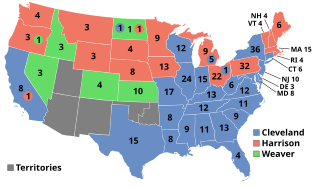
The 1892 United States presidential election was the 27th quadrennial presidential election, held on Tuesday, November 8, 1892. In a rematch of the closely contested 1888 presidential election, former Democratic President Grover Cleveland defeated incumbent Republican President Benjamin Harrison. Cleveland's victory made him the first and, to date, the only person in American history to be elected to a non-consecutive second presidential term. It was also the first time incumbents were defeated in consecutive elections—the second being Jimmy Carter's defeat of Gerald Ford in 1976, followed by Carter's subsequent loss to Ronald Reagan in 1980.
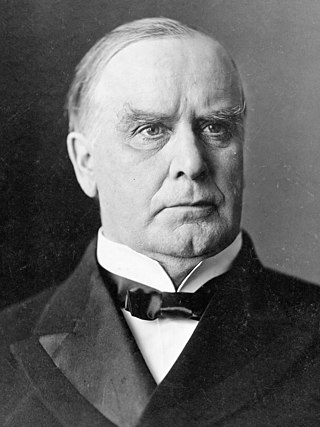
The 1900 United States presidential election was the 29th quadrennial presidential election, held on Tuesday, November 6, 1900. In a re-match of the 1896 race, incumbent Republican President William McKinley defeated his Democratic challenger, William Jennings Bryan. McKinley's victory made him the first president to win a consecutive re-election since Ulysses S. Grant had accomplished the same feat in 1872. Until 1956, this would be the last time in which an incumbent Republican president would win re-election after serving a full term in office. This election saw the fifth rematch in presidential history, something that would not occur again until 1956. This was also the first rematch to produce the same winner both times.
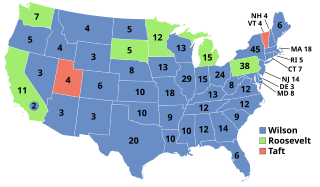
The 1912 United States presidential election was the 32nd quadrennial presidential election, held on Tuesday, November 5, 1912. Democratic Governor Woodrow Wilson unseated incumbent Republican President William Howard Taft and defeated former President Theodore Roosevelt, who ran under the banner of the new Progressive or "Bull Moose" Party. This is the most recent presidential election in which the second-place candidate was neither a Democrat nor a Republican. This is the most recent election to date in which four candidates received over five percent of the vote.

The 1920 United States presidential election was the 34th quadrennial presidential election, held on Tuesday, November 2, 1920. In the first election held after the end of World War I and the first election after the ratification of the Nineteenth Amendment, Republican Senator Warren G. Harding of Ohio defeated Democratic Governor James M. Cox of Ohio.

John Nance Garner III, known among his contemporaries as "Cactus Jack", was an American Democratic politician and lawyer from Texas who served as the 32nd vice president of the United States under Franklin D. Roosevelt from 1933 to 1941. Garner was also the 39th speaker of the United States House of Representatives from 1931 to 1933. He and Schuyler Colfax are the only individuals to have served as both Speaker of the House and Vice President of the United States.

Christine Temple Whitman is an American politician and author who served as the 50th governor of New Jersey from 1994 to 2001 and as Administrator of the Environmental Protection Agency in the administration of President George W. Bush from 2001 to 2003.

Kay Bailey Hutchison is an American attorney, television correspondent, politician, diplomat, and was the 22nd United States Permanent Representative to NATO from 2017 until 2021. A member of the Republican Party, she was a United States Senator from Texas from 1993 to 2013.

The Republican National Convention (RNC) is a series of presidential nominating conventions held every four years since 1856 by the United States Republican Party. They are administered by the Republican National Committee. The goal of the Republican National Convention is to officially nominate and confirm a candidate for president and vice president, adopt a comprehensive party platform and unify the party, as well as publicize and launch the fall campaign. Delegates from all fifty U.S. states and from American dependencies and territories such as Puerto Rico and the Virgin Islands attend the convention and cast their votes. Like the Democratic National Convention, the Republican National Convention marks the formal end of the primary election period and the start of the general election season. In 2020 all parties replaced the usual conventions with short online programs.
This article covers the history of women in the United States Senate and various milestones achieved by female senators. It includes a list of all women who have served in the Senate, a list of current female senators, and a list of states represented by women in the Senate. The first female U.S. senator, Rebecca Latimer Felton, represented Georgia for a single day in 1922, and the first woman elected to the Senate, Hattie Caraway, was elected from Arkansas in 1932. Fifty-eight women have served in the upper house of the United States Congress since its establishment in 1789. As of January 20, 2021, there are 24 women serving as U.S. senators.

John McAuley Palmer was an Illinois resident, an American Civil War general who fought for the Union, the 15th governor of Illinois, and presidential candidate of the National Democratic Party in the 1896 election on a platform to defend the gold standard, free trade, and limited government.
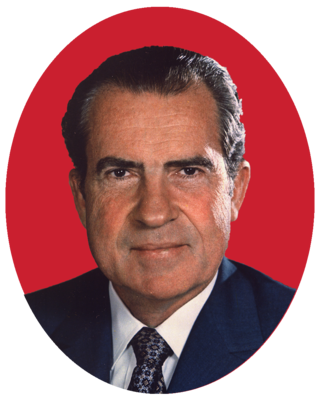
The 1972 Republican National Convention was held from August 21 to August 23, 1972 at the Miami Beach Convention Center in Miami Beach, Florida. It nominated President Richard M. Nixon and Vice President Spiro T. Agnew for reelection. The convention was chaired by House minority leader and future Nixon successor Gerald Ford of Michigan. It was the fifth time that Nixon had been nominated on the Republican ticket for vice president or president. Nixon's five appearances on his party's ticket matched the major-party American standard of Franklin D. Roosevelt, a Democrat who had been nominated for vice president once and president four times.
Mary Frances Tarlton "Sissy" Farenthold was an American politician, attorney, activist, and educator. She was best known for her two campaigns for governor of Texas in 1972 and 1974, and for being placed in nomination for vice president of the United States, finishing second at the 1972 Democratic National Convention. She was elected as the first chair of the National Women's Political Caucus in 1973.

This article is about African-American candidates for President of the United States. The article covers only candidates from major parties. On November 4, 2008, U.S. Senator Barack Obama (D-IL) was elected president of the United States. He was the first African American to win a presidential election and the first African American to serve as president of the United States. He was re-elected as president in 2012.
The 2012 Libertarian National Convention, in which delegates of the Libertarian Party (LP) chose the party's nominees for president and vice president in the 2012 general election, was held May 2–6, 2012, in Las Vegas, Nevada, at the Red Rock Resort Spa and Casino. Former Governor of New Mexico Gary Johnson won the presidential nomination on the first ballot. Retired California state court judge Jim Gray won the vice presidential nomination, also on the first ballot. The convention also chose to replace most of the Libertarian National Committee party officers and members-at-large.
Herman Paul Pressler III, is a retired justice of the Texas 14th Circuit Court of Appeals in his native Houston, Texas. Pressler was a key figure in the conservative resurgence of the Southern Baptist Convention, which he initiated in 1979.
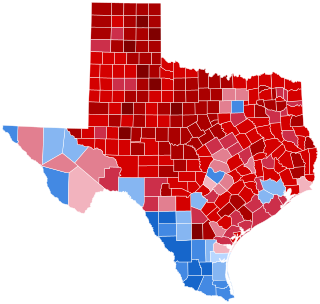
The 2016 United States presidential election in Texas took place on November 8, 2016, as part of the 2016 United States presidential election. Primary elections were held on March 1, 2016.
References
- ↑ "Female Politicians in Texas, N-P". PoliticalGraveyard.com.
- ↑ "Meet the Fundies". Texas Observer. October 7, 2005.
- ↑ "President-elect Bush Makes the Rounds in Washington, Promises Congressional Democrats an Open Door" (Transcript). Inside Politics. CNN. December 18, 2000.
- ↑ "Revised 2019 copy of appeal letter with form" (PDF). LWVHouston.org.
- ↑ "Agenda" (PDF). Harris County Commissioners Court. January 15, 2002. Archived from the original (PDF) on October 10, 2013.